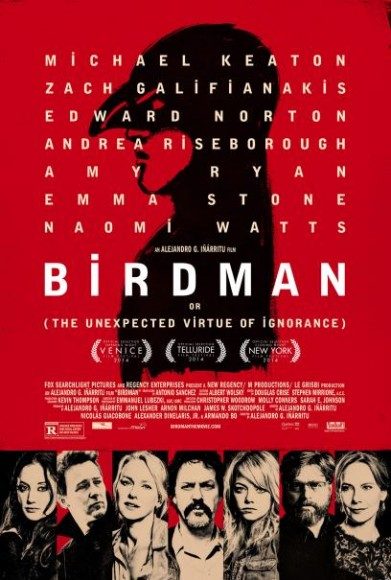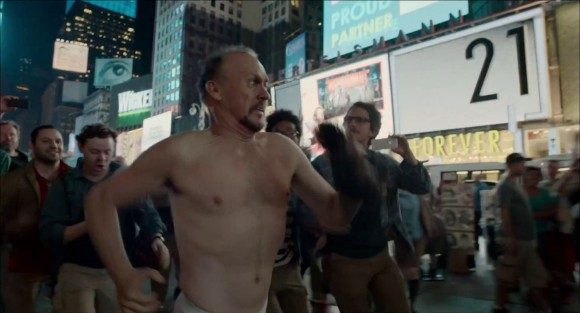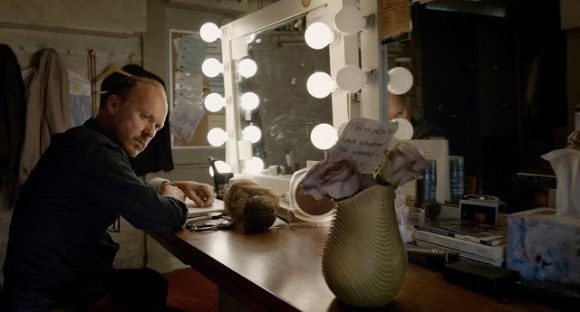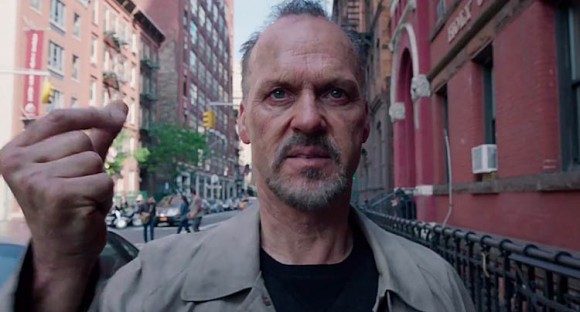Birdman is a movie where everything seems to fit together. It’s about an actor trying to be taken seriously as an artist after achieving fame and fortune in his youth as the star of superhero movies. And I’m talking about the character of Riggan Thompson, but the fact that I could just as easily be talking about Michael Keaton, the man who plays him, is characteristic of why this film is so good. Birdman is a movie that viciously takes down Hollywood’s infatuation with superheroes, yet seems to have undercurrents of love for those characters and the people who play them nonetheless. It’s a movie where nothing is simple, but everything comes together in a way that seems effortless, right down to the camerawork. Birdman is so consistently excellent, that even when it comes to the ending, what I consider to be its singular meaningful blemish, I can’t wait to see the movie again because I hope to understand its nuance better.
The aforementioned Riggan Thompson is our main character in Birdman, now on the back end of middle-aged and trying desperately to make a success of his soon-to-open Broadway adaptation of a Raymond Carver short story. Riggan is haunted in more ways than one by the specter of Birdman, the superhero he became famous for playing when he was younger, but is trying to prove he can be a serious artist with this play. He also needs it to succeed financially, as he’s nearly run through all his Birdman money, and spent not a little bit to make the play a reality in the first place. It is from this branch that all the other characters, and Riggan’s relationships with then, leaf out. There’s Mike Shiner (Edward Norton), a famously good and also famously difficult Broadway star who seems bent on sabotaging the play but is too good for business to boot off the production. Jake (Zach Galifianakis) is Riggan’s bedraggled producer, while Riggan’s daughter and assistant Sam (Emma Stone), who is also a recovering drug addict, is constantly lurking nearby. Then there’s Riggan’s ex-wife Sylvia (Amy Ryan) and co-stars of the play Lesley (Naomi Watts) and Laura (Andrea Riseborough), the latter of whom Riggan might have gotten pregnant.
That may seem like a lot of characters to keep track of, but Birdman pulls it off for a couple key reasons.
First and foremost, the acting is just stellar all around. Of that entire group, Norton’s the one who you might expect the most from, and he’s great, and Emma Stone also deserves a shout out for what might be her best performance to date; however, as much as this is an ensemble film, it’s still a film that’s all about Riggan, and Keaton is phenomenal. Riggan is a man living on the edge of nervous breakdown, and Keaton perfectly walks that line between insanity and ambition. You may have seen shots in the trailer of Keaton running around in his tighty-whities, but rest assured that the performance goes well beyond this kind of humor that can so easily turn slapstick, and in fact incorporates it into a picture of a man fighting with everything he’s got for both relevance and artistic validation, two things that are often at odds.
The other reason it works is because structurally, all the characters are needed. If you’re like me, you missed the reports about the key visual feature of this movie, but whether it’s been spoiled for you or not, you’re in for a treat. While never trying to perpetuate the myth that it actually is a single, 119 minute take, Birdman is shot in a series of long takes that give the illusion that it’s a single camera, continuous piece of filmmaking. This deserves recognition in its own right because it looks gorgeous (cinematographer Emmanuel Lubezki won the Oscar last year for his work on Gravity, an has been nominated on five other occasions; expect more of the same with this effort), but it also creates a blocking puzzle that’s solved by giving each character a subplot to pursue and weaving them together in a way that ensures we’re always seeing the highest moments of each. Not only does it mean that each character appears to us fully three dimensional, but it sidesteps the issue of having to watch Riggan sit around with nothing but his own thoughts too often (although this is tremendously entertaining every time it does happen).
All of this comes together to deliver a plot that may seem to occasionally divert from the main narrative, but is always forgiven for doing so because of how effortlessly it makes the transition and how it thematically ties the various subplots together. For Watts’s Lesley, for example, the opening of Riggan’s play is her first on Broadway, a lifelong dream finally fulfilled, but with all the trepidation that she’ll blow it baked in. And that’s the other part of why it works: no question meets simple answers. The comic book movie behemoth is shamelessly attacked for producing a constant stream of lowest common denominator, explosion-laden drivel, but Birdman also acknowledges the tremendous influence that such movies have and even the value they can offer. Art, and the difficulty of creating something truly transcendent is a constant theme in Birdman, and it isn’t afraid of asking if it’s all worth it.
Which brings me to the ending, which I won’t spoil but I will say is my one bugaboo with the entire production. As much as I’ve extolled how well the parts of Birdman seem to effortlessly fit together, much to the credit of director and co-writer Alejandro Inarritu, the ending is the stark exception to the rule. To its credit, it doesn’t attempts any trite or easy answers, but it just feels disjointed. I can formulate half a dozen reasonable explanations for what happens and what it means in the context of the whole of the picture, but none of them are convincing to me. Maybe I just don’t get what’s going on, and I’ll readily admit that it’s a possibility, paradoxically even a compelling one given what the film says about the complexity of good art (and I believe this movie is good art), but the ending does not seem to fit the rest of the film.
The Verdict: 5 out of 5
Plenty of films that end with such a disconnect struggle to remain rosy in the eyes of the viewer, so it speaks to Birdman’s quality that I can’t imagine grading it out as anything but a 5 out of 5 and giving it a full-throated recommendation. This is a movie that made me grin with joy through nearly the entire runtime, yet also had me thinking about some heavy thematic material. From Alejandro Innaritu’s incredibly clever, funny, and poignant script and directorial touch, to Emmanuel Lubezki and the stunning cinematography, to an incredibly capable cast led by Michael Keaton, Birdman is not to be missed.




